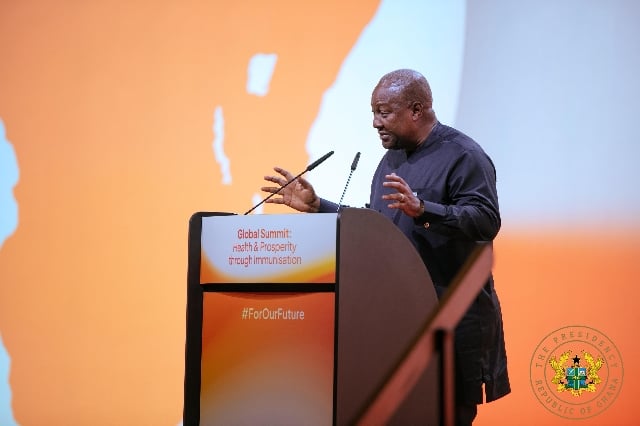Ghana’s President John Dramani Mahama, speaking at the GAVI Global Summit in Brussels, articulated a visionary ambition: to transition Ghana from a recipient of vaccine aid to a donor nation by 2030, and potentially even sooner. This declaration signifies a bold step forward in Ghana’s health policy and a commitment to self-sufficiency in its immunization programs. President Mahama underscored Ghana’s determination to emulate countries like Indonesia, who have successfully graduated from GAVI support and subsequently become contributors, demonstrating a commitment to global health security. This aspiration is underpinned by the significant progress Ghana has made in its immunization coverage, reaching an impressive 97% rate, positioning the nation among the top performers globally.
This near-universal coverage is a testament to the efficacy of Ghana’s partnership with GAVI, the Vaccine Alliance, an organization dedicated to improving access to immunization in developing countries. President Mahama acknowledged the pivotal role GAVI has played in Ghana’s success story, emphasizing the importance of international collaboration in achieving public health goals. Despite the remarkable achievements, the President also recognized the ongoing challenge of reaching the remaining 3% of unvaccinated children, primarily located in remote and underserved areas. He underscored the government’s unwavering commitment to ensuring that every child in Ghana receives the necessary vaccinations, highlighting a dedication to equitable healthcare access for all citizens.
The President emphasized that Ghana’s pursuit of self-reliance in vaccine financing is not solely driven by its improving economic status but also by a deep commitment to solidifying its immunization program and contributing to global health security. He highlighted Ghana’s significant financial contributions to vaccine programs, totaling nearly $67 million in recent years through co-financing partnerships with GAVI. This demonstration of financial commitment signifies Ghana’s increasing ownership of its health agenda and its willingness to invest in the well-being of its citizens. The President’s message serves as a powerful example of a developing nation taking proactive steps towards sustainable healthcare financing.
Further demonstrating the prioritization of health within national policy, President Mahama detailed a key decision made early in his presidency: the removal of the cap on the National Health Insurance Fund. This policy shift, overturning a restriction imposed by the previous administration, unlocked over 3.5 billion cedis (Ghanaian currency) in additional resources for the national health insurance scheme. This injection of funds enabled Ghana to front-load $20 million towards its co-financing commitment with GAVI for the current year, showcasing a strong commitment to meeting its international obligations and investing in the health of its population. This strategic financial maneuver underscores the government’s commitment to strengthening the national healthcare system.
President Mahama’s address at the GAVI summit concluded with an expression of deep gratitude towards GAVI and the international community for their sustained support. He acknowledged the life-saving impact of the donations received and emphasized the importance of global partnerships in achieving health equity. His heartfelt thanks extended to all the countries that have pledged new funds towards GAVI’s replenishment, recognizing the collective effort required to ensure global health security. This expression of gratitude reinforces the importance of international collaboration and shared responsibility in tackling global health challenges.
In essence, President Mahama’s pronouncements at the GAVI summit signal a paradigm shift in Ghana’s approach to global health. The nation is transitioning from being a beneficiary of aid to aspiring to be a contributor, reflecting a growing confidence in its economic capabilities and a commitment to sustainable health financing. The pursuit of GAVI graduation by 2030, coupled with the commitment to reaching every unvaccinated child, demonstrates a clear vision for the future of healthcare in Ghana. President Mahama’s address underscores the importance of strategic partnerships, sustainable financing, and a resolute focus on achieving universal health coverage, setting a powerful example for other developing nations striving for self-reliance in healthcare.


